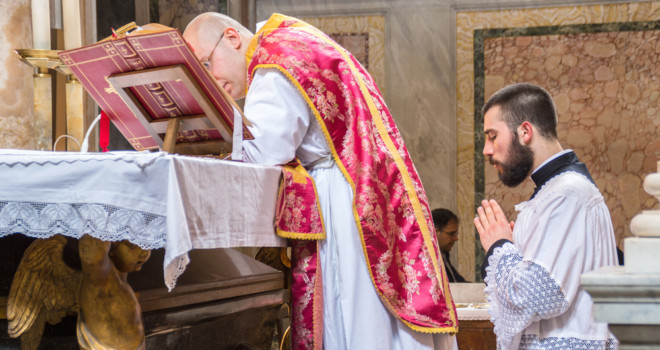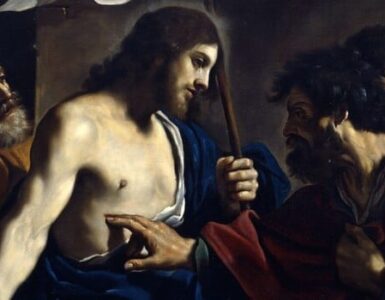Growing up Protestant, I never thought I would become a Catholic priest, let alone one who wrote a book on celibacy.
Because
we moved a lot, my family was involved in various churches over the years and I
got to know several of our pastors. My recollection of these men is thoroughly
positive; they were kind, engaging, thoughtful people who loved Christ and took
my youthful questions and problems seriously.
About
Catholic priests I knew much less. I knew they were celibate. I had even met a
few of them because in some of the countries in which we lived, I attended
Catholic schools. Their celibacy was intriguing, something of a curiosity – but
it was the curiosity of a detached tourist, not that of an interested inquirer.
Like
many conversion stories, my path to Rome began with the witness of faithful
Catholics, the reading of good books, and the fits and starts of a life of
prayer. I was in college at the time. At the end of one of our sessions, the
priest who was giving me instructions said, almost in passing, that perhaps I
would join him at the altar one day.
At
this point, mind you, I was not even Catholic; I wasn’t even sure I wanted to
be Catholic; and I was very certain that I would never be a
celibate priest. I went away stewing on what he said; I was appalled at the
very idea of becoming a priest, and frankly thought it rather brazen of him to
suggest it.
So
what happened? To put it in a nutshell, my understanding of celibacy changed
when my understanding of the priesthood changed. And my understanding of the
priesthood changed when my understanding of the Eucharist changed.
As
a Protestant, Sunday services make sense only in the context of a community of
believers. I was intrigued, then, to learn that it was not so for the Catholic
Mass. It is not unusual to enter a cathedral in Europe, for instance, and find a
Mass being offered at a side-altar by a priest alone or with a single server. The
Holy Sacrifice is always offered for the good of all the faithful, of course,
but the Mass occurs whether or not many are able to physically be there.
It
is the priest who makes the Mass possible because he stands in the place of
Jesus the High Priest offering Himself in loving oblation to the Father. That
understanding of the Holy Eucharist opened up for me a new way to perceive
ordained ministry. The Protestant pastors who served my family were good men
but none made any pretensions of standing literally in the place of Christ
during Sunday services, or at any other time. The priest, in contrast, is a man
who represents Christ with staggering literalism as he feeds his people with
the supernatural Bread of Life.
My
new Eucharistic perspective on the priesthood soon broadened. The priest is a
man who not only feeds his people but who gives new birth in the sacrament of
Baptism; who heals sinful wounds in Confession; who preaches the Gospel and
teaches with words of instruction, exhortation, encouragement, and correction; and
who strives, as a good shepherd, to protect his people from the hungry wolves
of sin and error.
Now
– what do we call a man who gives life, who provides, who heals, who teaches,
and who protects? We typically call priests “Father” in ordinary conversation. It
turns out that’s exactly what they are!
When
I really grasped the priest’s spiritual fatherhood, I finally understood
celibacy. The married pastors whom I knew growing up always tried to make time
for me, but I never had any doubt who came first in their lives. It was not me,
but their wives and children – as well it should have been. When it comes to
priests, it’s different. A priest is a spiritual father, a man who belongs
unreservedly to his Lord and to His people. He belongs to you and to me. You
and I come first in his life.
Where
does celibacy fit in?
A
father must provide for his family. A priest provides for his spiritual family
through the sacraments and especially the Eucharist. Celibacy helps a priest
provide these sources of supernatural life with generosity and a more radical
availability. Spiritually, too, there is a strong link between the sacrifice of
celibacy on the part of a priest and the sacrifice that he offers on the altar.
His personal sacrifice echoes and draws strength from the sacrifice of Calvary,
which the priest makes present each day in the Holy Mass. His celibacy is an
oblation that is united to that of Christ himself, for the good of the Church
and the whole world.
A
father must teach and guide his family. A priest does so by imparting good
doctrine and by his preaching. When celibacy is lived generously, there is a
contemplative receptivity to the Lord that St. Paul described as an “undivided
heart.” This interior availability can be, should be, highly conducive to the
interior life, which overflows into the lives of his hearers. Many Catholics, I
suspect, have had the experience of a saintly priest preaching with a certain
hidden power.
On
faculty at my seminary, years ago, there was an elderly priest whose homilies
were invariably simple and rhetorically unexciting. Yet they were among the
most memorable and powerful in all my years of formation, because they emerged
from a life of profound union with Christ. His homilies were not always
naturally inspiring, but they were supernaturally inspired – and that made them
truly lifegiving. His celibacy offered him the opportunity and spiritual space
to nourish that contemplative union in a way that overflowed into preaching and
moved hearts.
Finally,
a father must protect his family. A priest-father must protect his spiritual
family from both physical and spiritual harm. Celibacy frees a man to defend
his people from outside threats, even at the cost of his life, without hesitation.
These threats may be physical, as in the case of St. Maximilian Kolbe who
offered himself for execution in place of a fellow (married) prisoner.
More
commonly, the threats are spiritual or moral, and here too celibacy comes to
the aid of the priest. It can be hard to preach the whole Gospel, including the
unpopular and difficult parts. And yet if a priest is to give his people the
tools they need to protect themselves from error, that’s what he must do. Celibacy,
when lived well, can free a man from any concern for status, affirmation,
advancement, or financial growth, and so free him to protect his people from
error even when it is difficult – even when they themselves do not see the
danger.
As a young person, I never imagined for a moment that I would one day be a celibate priest. Once I began to understand the nature of the priesthood, however, that it is a vocation of genuine spiritual fatherhood, I realized that I did not need to abandon my natural desires to follow the Lord in this vocation. Now, I cannot see myself as anything but a celibate priest. As a young man I wanted to be a husband and a father. Now, I realize, that’s exactly what I am.
image: Thoom / Shutterstock.com












